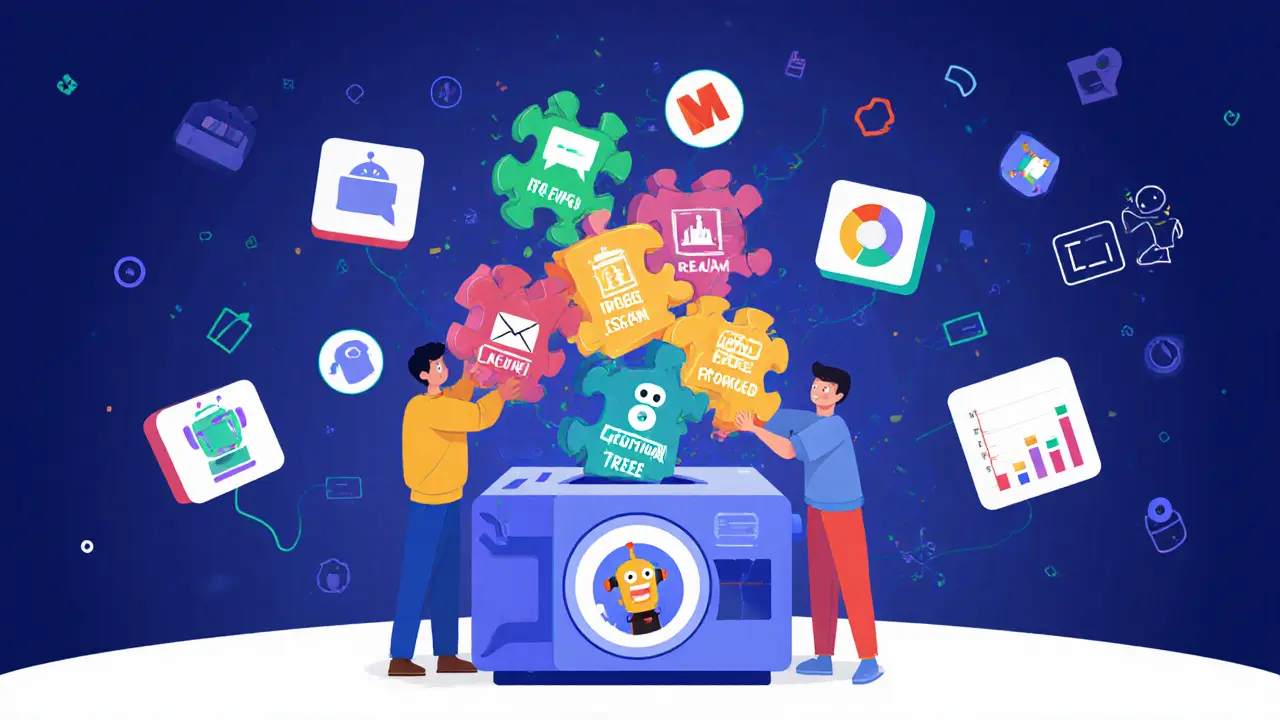AITECH GPU Cost Calculator
Compare your AI computing costs between traditional cloud providers and Solidus Ai Tech's decentralized platform. Based on data from the article: Traditional cloud costs $0.50/hour vs AITECH's $0.018-$0.074/hour.
Results
Most crypto coins are either digital money or speculative assets. But AITECH isn’t trying to be Bitcoin or Ethereum. It’s built to power artificial intelligence - and it’s doing it on a blockchain. If you’ve ever wondered how AI can run without big tech companies controlling every bit of processing power, Solidus Ai Tech (AITECH) offers one answer: a decentralized network where anyone can rent or lend AI computing power using a crypto token.
What Exactly Is Solidus Ai Tech?
Solidus Ai Tech, or AITECH, is a blockchain-based platform that turns unused AI computing power into a tradable resource. Think of it like Airbnb for AI. Instead of renting a room, you’re renting GPU cycles - the heavy-duty processors that run machine learning models. Users who need AI services (like image recognition, chatbots, or predictive analytics) pay in AITECH tokens. People who have spare computing power - whether it’s a high-end GPU in their home or a server farm - can contribute it and earn AITECH tokens in return.
The platform launched in 2021 and is headquartered in Dubai, but its main data center is in Bucharest, Romania. That facility spans 8,000 square feet and runs entirely on renewable energy. By 2025, it’s expected to reach Tier 3 compliance - meaning it’s built for reliability, redundancy, and enterprise-grade uptime. That’s unusual in crypto, where most projects are just code on a server. Solidus has actual hardware.
How Does AITECH Work?
AITECH runs on Ethereum smart contracts. These contracts handle everything: who’s renting what, how much they’re paying, and when payments are released. There’s no middleman. If you want to train a custom AI model, you submit your request. The platform matches you with the best available node (a computer in the network) and charges you in AITECH. You don’t need to know how the hardware works - you just get results.
The platform’s core is called the AI Marketplace. It has five layers that handle everything from data input to model deployment. At the top is Agent Forge - a no-code tool that lets anyone build AI agents without writing a single line of code. Want a bot that automatically replies to customer emails? Or one that scans product images for defects? You drag and drop components, set rules, and deploy it. Agent Forge is what makes this platform accessible to small businesses, freelancers, and even students.
Why AITECH Instead of AWS or Google Cloud?
Big cloud providers like Amazon Web Services or Google Cloud offer AI tools, but they’re expensive and centralized. If you’re a startup or indie developer, you’re at their mercy on pricing and availability. Solidus flips that model.
Here’s the difference:
- Traditional cloud: You pay $0.50/hour for GPU time. You can’t negotiate. Downtime? You’re out of luck.
- Solidus Ai Tech: Prices range from $0.018 to $0.074 per hour (as of late 2024). You can choose from dozens of providers. If one node goes down, another picks up the work.
Plus, Solidus is transparent. Every transaction is on the blockchain. You can see exactly where your data is being processed and who’s running the model. That’s a big deal for privacy-focused users or companies dealing with regulated data.
The eco-friendly angle also matters. Traditional AI training can use as much energy as a small country. Solidus’s Bucharest center runs on wind and solar. That’s not just a marketing gimmick - it’s a real competitive edge as governments push for green tech.

How Do You Earn AITECH Tokens?
You don’t mine AITECH like Bitcoin. There’s no energy-hungry proof-of-work. Instead, you earn by contributing computing power. If you have a powerful GPU, you can join the network as a provider. The platform automatically assigns AI tasks to your machine. When it completes them, you get paid in AITECH.
Or, if you don’t have hardware, you can stake your tokens. Staking means locking up your AITECH for a set period - 30, 90, or 365 days - and earning interest. APYs vary between 5% and 18%, depending on the lock-up time. It’s not guaranteed, but it’s one of the few crypto projects where staking ties directly to real-world utility: supporting AI infrastructure.
Market Performance and Volatility
AITECH launched in August 2023. At its peak in early 2024, it hit a market cap of over $110 million. By September 2024, that number dropped to $34 million. The token price swung from $0.07 to under $0.02 in a few months. That’s typical for small-cap crypto projects - but it’s not a sign of failure. It’s a sign of early-stage volatility.
Here’s what the numbers show:
| Metric | Value |
|---|---|
| Circulating Supply | 1.72 billion tokens |
| Total Supply | 1.99 billion tokens | Market Cap | $34.4 million |
| Market Rank | #631 |
| Price Range (30-day) | $0.018 - $0.074 |
Some analysts predict AITECH could hit $0.16 by the end of 2025. Others say it’ll stabilize around $0.03-$0.04. The truth? No one knows. But what’s clear is that its value isn’t just speculation - it’s tied to real usage. If more people start using Agent Forge or renting GPU time, demand for AITECH will rise.
Who Is This For?
AITECH isn’t for everyone. If you’re just looking to flip a coin for quick profits, this isn’t it. The price swings are too wild, and the platform requires effort to use.
But if you’re:
- A developer who needs affordable AI tools
- A small business owner wanting to automate tasks
- A student learning machine learning without a big budget
- Someone with spare GPU power looking to earn crypto
- An investor who believes in decentralized AI
- then Solidus Ai Tech offers something unique. It’s not just a token. It’s infrastructure you can use, rent, and help build.

Challenges and Risks
There are real hurdles. The platform has only about 15,000 active users. That’s tiny compared to big cloud providers. Most people still don’t know it exists. Onboarding can be confusing - especially for non-tech users. The documentation is solid, but the intro guides assume you already understand blockchain.
Competition is fierce. Projects like SingularityNET (AGIX) and Fetch.ai (FET) are also trying to build decentralized AI networks. Solidus stands out because of its physical data center and focus on sustainability - but that’s not enough. It needs more users, more developers, and more partnerships.
Regulation is another wildcard. The EU’s AI Act is coming into force. Solidus’s location in Romania gives it an advantage - but if crypto regulations tighten globally, it could affect token usage.
What’s Next for Solidus Ai Tech?
The roadmap is clear:
- Complete Tier 3 certification for the Bucharest data center by 2025
- Expand to other blockchains (like Polygon and Solana) to lower fees and speed up transactions
- Add more AI tools to Agent Forge - voice synthesis, real-time analytics, and multi-agent collaboration
- Partner with universities and startups for pilot programs
If they hit these goals, AITECH could become the go-to platform for decentralized AI. If they don’t, it might fade into obscurity like dozens of other crypto projects.
Right now, it’s a gamble - but it’s a gamble on something real. Not just hype. Not just speculation. Actual computing power, actual AI, and actual users building tools on a blockchain.
Frequently Asked Questions
Is AITECH a good investment?
It depends on your goals. If you’re looking for quick profits, AITECH’s volatility makes it risky. But if you believe in decentralized AI and want to support a platform that actually delivers real computing power, it could be a long-term play. Many analysts see potential because it’s tied to real-world AI demand, not just speculation. Still, only invest what you can afford to lose.
How do I buy AITECH tokens?
You can buy AITECH on exchanges like Gate.io, MEXC, and Bitrue. You’ll need to first buy ETH or USDT, then trade it for AITECH. Once you have it, store it in a wallet like MetaMask or Trust Wallet. Avoid keeping large amounts on exchanges.
Can I use AITECH without knowing how to code?
Yes. Agent Forge is a no-code platform designed for non-developers. You can create AI agents using drag-and-drop tools - like building a chatbot that answers FAQs or a system that categorizes images. You don’t need programming skills, but you do need to understand what you want the AI to do.
Is Solidus Ai Tech eco-friendly?
Yes. Unlike Bitcoin mining, which uses massive amounts of electricity, Solidus runs its data center on renewable energy. Its Bucharest facility is powered by wind and solar, and it’s designed to be energy-efficient. This is one of the few crypto projects that actually addresses environmental concerns.
How does AITECH compare to other AI crypto coins like AGIX or FET?
AITECH is different because it owns physical infrastructure. AGIX and FET are mostly software platforms that connect users to AI models - but they don’t run their own servers. Solidus has an 8,000 sq ft data center with real GPUs. That gives it more control over performance, reliability, and sustainability. But it also means higher operational costs. It’s a trade-off between control and scalability.


Raymond Day
This is literally the most overhyped crypto I’ve seen since Dogecoin… but with more buzzwords. 😅 GPU renting? Bro, I’ve got a 3090 collecting dust in my closet-why am I supposed to trust some Dubai startup with my hardware??
Diana Dodu
USA built the internet. USA leads in AI. And now some Romanian data center with ‘renewable energy’ is supposed to beat AWS? Please. This is just another ‘decentralized’ scam to get dumb investors to buy tokens while the real tech stays in Silicon Valley. #AmericaFirst
Michael Brooks
Actually, this isn’t bad. I’ve used their platform for a small ML project last month. Got a custom image classifier running for $0.02/hour. Way cheaper than AWS. The UI is clunky, but it works. And yeah, the energy use is legit green. Not just marketing.
Michael Faggard
The architecture is sound. Decentralized inference layer on Ethereum smart contracts with a hybrid edge-node topology. The Agent Forge interface reduces cognitive load for non-engineers. But the liquidity risk is non-trivial-market cap under $40M means slippage on any trade over 50k tokens.
Elizabeth Stavitzke
Oh wow. A crypto project that doesn’t just promise to ‘revolutionize’ but actually has a 8,000 sq ft facility? How quaint. Next they’ll tell me their CEO doesn’t have a yacht. 🤡
FRANCIS JOHNSON
This is the future. Not just crypto. Not just AI. But the *merging* of the two-where power isn’t owned by corporations, but shared by people. Think about it: your old gaming rig becomes part of a global brain. That’s not tech. That’s evolution. 🌱🤖
Ainsley Ross
I’m from the US but lived in Bucharest for a year. That data center is real. I visited it. The solar panels on the roof? Actually working. The engineers are all local, well-paid, and speak fluent English. This isn’t a shell company. It’s a community project with real people behind it.
William Moylan
They’re using Romania because the government’s in their pocket. Did you know the EU’s AI Act is being watered down because of ‘lucrative partnerships’? This isn’t green tech-it’s a front for data harvesting. Your AI training data? Probably being sold to shadow agencies. Wake up.
Atheeth Akash
I tried staking 5000 AITECH for 90 days. Got 8% APY. Not bad. The platform is slow but stable. I dont know much about blockchain but i use agent forge to make a bot for my small shop. it replies to customers. works good
Arthur Crone
Market cap dropped 70% in 6 months. Active users: 15k. Competitors have 200k+. This isn’t innovation. It’s a dying ember. Stop pretending it’s the next big thing. It’s not.
David Billesbach
They’re not even using their own blockchain. Running on Ethereum? That’s like building a luxury yacht and towing it behind a rowboat. And ‘Tier 3 compliance’? That’s just a fancy term for ‘we have backup generators’. This is vaporware dressed in sustainability pajamas.
Douglas Tofoli
i bought some aitech last month cause i thought it was cool. turned out my gpu is too old to join the network 😅 but agent forge is actually fun to play with. made a bot that auto-tags my instagram pics. its kinda dumb but i love it
Ruby Gilmartin
Let’s be brutally honest: the tokenomics are a disaster. 1.99B total supply with only $34M market cap? That’s a 0.017% utilization rate. This isn’t a platform-it’s a dilution engine. Anyone holding this long-term is either delusional or complicit.
Joanne Lee
I’m a grad student in machine learning. I used Agent Forge to prototype a sentiment analyzer for my thesis. Took me 20 minutes. No code. No cloud credits. Just drag, drop, deploy. If this helps students like me access AI without debt, it’s already a win.
Andy Purvis
I don’t know if this will work or not. But I like that someone’s trying something different. Not every crypto project needs to be a pump. Maybe this one’s just… quiet. And real.
Brian Gillespie
I’ve got a 4090 sitting idle. Might try joining the network. If it’s as easy as they say, why not?
Noriko Yashiro
I’ve been researching decentralized AI for months. Solidus is the only one with actual hardware. The rest are just APIs talking to other APIs. This? This is infrastructure. It’s not sexy. But it’s necessary.
Wayne Dave Arceo
The fact that you’re even considering this as a viable alternative to AWS shows how far we’ve fallen. The US leads in AI innovation. This is just a distraction. Focus on building real companies-not crypto ponzi schemes disguised as ‘ecosystems’.
James Ragin
They’re using renewable energy? That’s a cover. The real goal is to create a backdoor into global AI infrastructure. Once they control the nodes, they control the data. And once they control the data, they control the narratives. This isn’t decentralization. It’s a Trojan horse for surveillance capitalism.